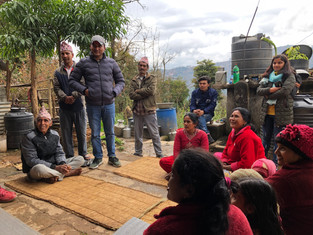How farmers in Nepal fight Climate change
- erina oyama

- Feb 15, 2021
- 2 min read

(One of the world heritage sites collapsed by the earthquake. China and JICA have been competitors in aid projects since.)
Hi! I'm Erina from business team!
Last spring, I visited Nepal to study about Disaster risk reduction policies. In 2015, Nepal had an earthquake of magnitude 7.8, seismic intensity of 5 to 6. This earthquake affected about 8 million people which is 30 percent of Nepal's population, with more than 22,000 people injured and 790,000 half-destroyed buildings.
My study team & me visited JICA ( Japan International Cooperation Agency), UNDP, and the government of Nepal to research about their awareness and future policies of disaster risk reductions.
We also visited farmers who live in ‘Chotala’ in the Sindhupalchok group northeast of Kathmandu (pointed in red) and JICA have been supporting their agribusiness so that’s why we had a chance to talk with them. Nepal is an agricultural country where 66% of the country's working population (ages 15-60) is engaged in agriculture. Moreover, agriculture accounts for 36% of Nepal’s GDP. The Nepalese government has targeted the practice of "profitable agriculture" and "productivity improvement", among which it cited "the implementation of research in the agricultural field in accordance with the needs of farmers and agrobusinesses" as its main actions.
When we had discussions with the local farmer, we asked about how climate change was harming their agribusiness (picture on the right). They answered that even though they have been taught to practice a resilient farming from JICA by making the green house, planting suitable crops, using preferable fertilizers to make strong soil and crops but still the increasing of rainfall is damaging their harvested result. They even showed us a garden that was washed out from the heavy rain. Listening to their stories, that was when I truly felt that one small action I make towards climate change is not even small at all.
For example, if one person determines to stop buying their plastic bags for their whole life, that will make a great change to the environment. (I’m 20 years old right now and I’m guessing I will live to at least 80, a Japanese consume 450 plastic bags on average in one year, (80-20)×450=27,000 plastic bags I will save in my whole life!!!) This experience in Nepal was also one of the big reasons I wanted to make a real action in the development field.
Well, if we buy su-re.co products, we can directly contribute to provide clean energy resources, solve hunger problems, air pollution, climate change, etc.… at the same time. And you can easily see how much you have contributed. I believe this is one of the attracting points of su-re.co products.
Please don’t think that your actions are too little to solve environmental problems. There will always be someone who is thanking you for your action.






Comments